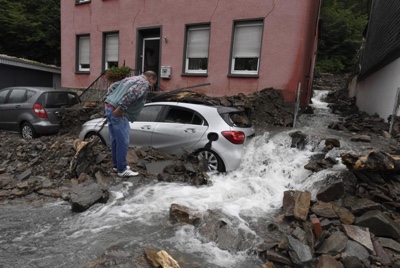Imprecise forecast and modelling, “flood dementia”, and inadequate early warning systems are some of the issues to be addressed to improve flood resilience and prevention, according to Zurich.
 Last year, the extreme weather event “Bernd” caused great human suffering, and millions in damage; such as primary German insurer Provinzial gross claims of at least €1bn from the flooding in the country.
Last year, the extreme weather event “Bernd” caused great human suffering, and millions in damage; such as primary German insurer Provinzial gross claims of at least €1bn from the flooding in the country.
Zurich found that, even though this event was not inevitable, if detected in time, its potential consequences could have been addressed with better outcomes.
The study showed that an inadequate understanding of floods, a problematic structure for rebuilding and insufficient pre-emptive risk reduction measures played a key role in the disaster.
Many of those affected described the flood disaster as ‘unprecedented’ and ‘unforeseeable’, but this is incorrect as records show there have been floods of similar magnitude in the country, Michael Szönyi, head of Zurich’s Flood Resilience Program explained.
Some examples on record include floodings in the Ahr Valley in 1804 and in 1910. According to Szönyi, they were forgotten too quickly, and when it flooded again in 2016 flood resilience schemes from the 1920s were never implemented.
Today, less than a year after Bernd, demand for natural hazard insurance has already dropped back to pre-disaster levels, according to Zurich.
“The ability to deal with natural hazards has declined among the population as a whole. Awareness that floods can and do happen, and of their potential severity, therefore needs to be embedded more strongly and permanently in people’s minds,” Szönyi said.
Zurich experts advice to achieve this include commemorating the victims of floods, evacuation drills, and community information sessions on the dangers of flood events.
They also emphasised that flood events should not be characterised as “entirely unexpected” or “unprecedented”.
Michael Szönyi warned that “verbally dramatising an event as a singular disaster causes people to intuitively misjudge the probability of it occurring.
“At the same time, public discussions often focus solely on climate change as the cause of these extreme weather events and their consequences. This unhelpfully narrows the public perspective to just one of the many factors which ultimately lead to these disasters. As a result, the focus shifts away from prevention.”


